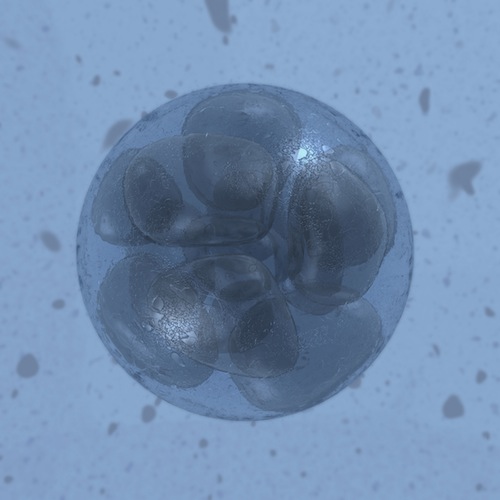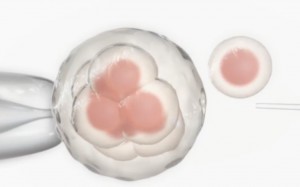Japanese scientists have developed a process for forming a chimeric embryo by planting a human stem cell into an animal embryo, usually a pig. The organs would then mature inside the animal until scientists harvest and transplant them into a human body.
Tag: embryo
Breakthrough for IVF? Selecting the Most Promising Embryos
 A recent study in Reproductive BioMedicine Online on 5-day old human blastocysts shows that those with an abnormal chromosomal composition can be identified by the rate at which they have developed to blastocysts, thereby classifying the risk of genetic abnormality without a biopsy. In a new study the same group has undertaken a retrospective study, using their predictive model to assess the likelihood of any embryo transferred resulting in a successful pregnancy, with very encouraging outcomes.
A recent study in Reproductive BioMedicine Online on 5-day old human blastocysts shows that those with an abnormal chromosomal composition can be identified by the rate at which they have developed to blastocysts, thereby classifying the risk of genetic abnormality without a biopsy. In a new study the same group has undertaken a retrospective study, using their predictive model to assess the likelihood of any embryo transferred resulting in a successful pregnancy, with very encouraging outcomes.
One of the greatest challenges in assisted reproduction is to find the one embryo, which can develop successfully. Now, combining time lapse imaging of IVF embryos cultured for 5 days to the blastocyst stage with trophoblast biopsy, it has proved possible to correlate the rate of blastocyst formation with chromosomal abnormalities. Such an approach should allow early and widely accessible non-invasive identification of the best embryo to place in the uterus. Read full article…
Cloning, Stem Cells Long Mired In Legislative Gridlock
The news that U.S. scientists have successfully cloned a human embryo seems almost certain to rekindle a political fight that has raged, on and off, since the announcement of the creation of Dolly the sheep in 1997.
Making Babies: Selling Embryos, Despite Ethical Concerns, Addresses Genuine Needs
The latest round of ethical contretemps is an intriguing April article in The New England Journal of Medicine, “Made-to-Order Embryos for Sale—A Brave New World?” which discusses—comprehensively and dispassionately—many of the concerns raised about embryo donations, whether gifted or for sale.
Birth Rates Good After Implanting 1 Embryo, Study Finds
Among women who undergo in vitro fertilization (IVF) to become pregnant, there is no difference in delivery rates among those implanted with one prescreened embryo compared to those implanted with two unscreened embryos, new study findings reveal.
Powder Women’s Eggs for Home Storage
Just add water and sperm – any romance should be provided separately. In future, women who want to safeguard their fertility may be able to store their eggs at home as a powder. To revive them for an attempt at having a baby, all they would need to do is empty the sachet, add water, fertilize with sperm and implant the embryo.
Embryo-like stem cells enter first human trial

It will be the first clinical study to put induced pluripotent stem (iPS) cells into humans — and where more fitting than in Japan, where Shinya Yamanaka garnered a Nobel prize last December for showing how to take bodily cells and return them to an embryo-like pluripotent state.
Masayo Takahashi of the Center for Developmental Biology in Kobe just cleared the second and, observers say, most difficult hurdle in starting her iPS cell trial to treat age-related macular degeneration, a condition that affects the retina and can lead to blindness.
On Wednesday an institutional review board (IRB) at the Institute for Biomedical Research and Innovation(IBRI), which is going to sponsor the trial, gave conditional approval. The team needs now only to notify the IRB of the final results of some preclinical safety trials now underway (see story in Japanese). Read full article.
Embryo Donation. The New Modern Family
Up until now, an accepted alternative pathway for couples to build a family has been the adoption process. But with recent advances in reproductive medicine, building a family through embryo donation is something newer that has made …
Clinics to Begin Tests for Genetic Disorders in Embryos
 COUPLES who want to find out if they are going to have a baby with an inherited disorder can now avail of controversial tests in Irish clinics for the first time.
COUPLES who want to find out if they are going to have a baby with an inherited disorder can now avail of controversial tests in Irish clinics for the first time.
Embryos produced through IVF can now be tested to show if they are free of specific disorders, such as cystic fibrosis. It means the couple can choose not to have an embryo which proves positive for the disorder implanted in the mother’s womb.
Couples previously had to go abroad for the tests, but licences have been granted to the Beacon CARE Fertility Clinic in Dublin and the Cork Fertility Clinic. Read full article.
Comprehensive Chromosomal Analysis Shown to Improve IVF Outcomes
Researchers at the 68th Annual Meeting of the American Society for Reproductive Medicine presented research showing that by screening all the chromosomes in an embryo the number of successful pregnancies could be increased over traditional methods of Assisted Reproductive Technologies (ART).